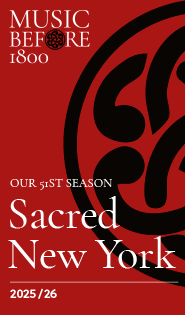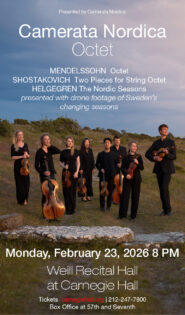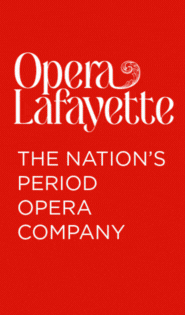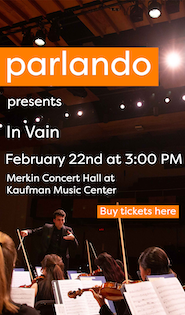Beat poets take a vocal Village Trip in premiere-packed festival opener
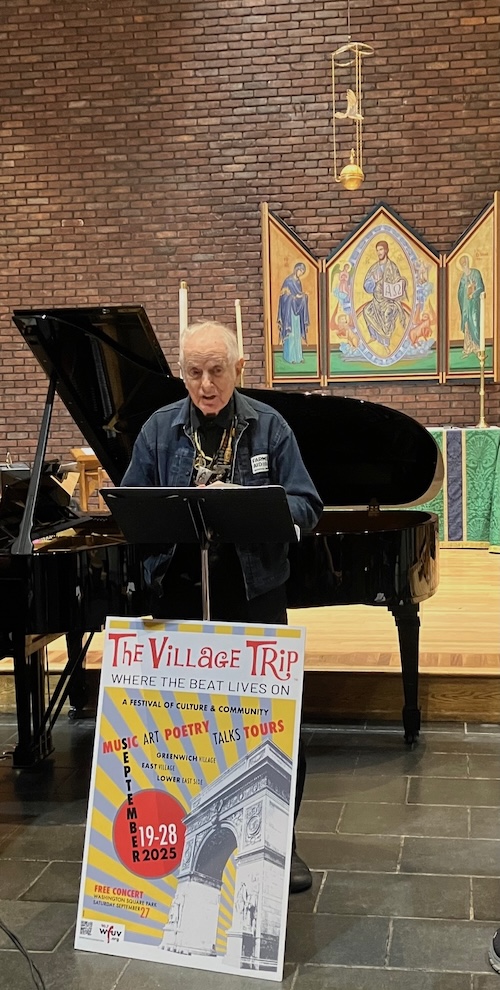
The multifarious annual downtown festival known as The Village Trip launched Friday night with, of all things, a song recital.
More populous events await, but for the time being it was just baritone James Martin and pianist Lynn Raley (with a guest turn by cellist Michael Cameron) unveiling new song cycles that celebrated the poets and composers of Greenwich Village.
An enthusiastic audience filled St. John’s Church in the Village to its modest capacity to hear evocative world premieres by David Amram, Carman Moore and Maria Thompson Corley.
It would be hard to imagine a festival opening in a more unassuming fashion than this one, with a single singer humming softly. Baritone Martin’s spiritual-style hum was answered by rolling waves in the piano as Corley’s cycle The Convex Beauty of Sailing Souls got under way with “Shipwreck.”
In a program note, the composer told of her charismatic, multi-talented brother T. Lloyd Thompson (“Terry”), who died decades ago at age 25, and whose poetry she sought to “amplify” by setting it to music. She also noted a “theme of death” running through all five of the poems in this cycle.
That theme was submerged in “L’Automne,” with its playful piano part recalling Mussorgsky’s “Tuileries.” Martin intoned the poet’s texts with impeccable diction, his baritone keeping its oaken character even in its highest range.
“Memos” dropped to an adagio tempo, with ghostly strums on the piano strings and a persistent, tolling high octave. In “For a high school friend,” Raley again reached into the piano to mute the notes of an ostinato, which repeated obsessively as pianist and singer turned up the dramatic heat. Martin achieved both a natural, speech-like rhythm and a sustained line in “October 7, 1983,” as the piano marched in low chords, bringing the cycle gently to a close.
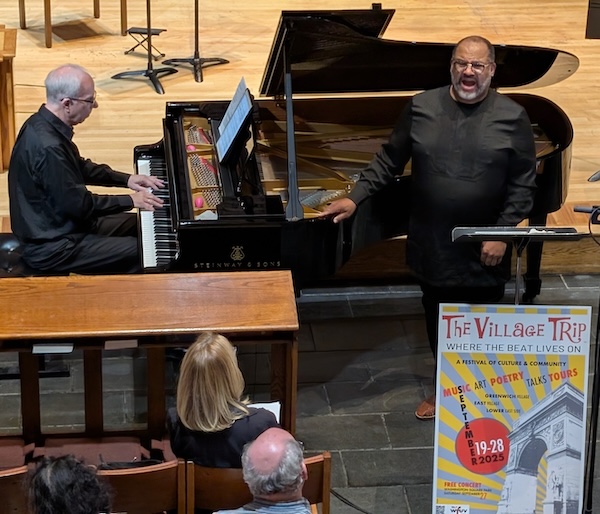
Two residents of Patchin Place, the Village’s celebrated “poet’s corner,” plus a West Indian immigrant, provided texts for Carman Moore’s three-song cycle A Village Triptych (a pun on the name of this festival, perhaps?). Poet Gamel Woolsey’s “Winter Night Blues” received a frosty setting of soft tremolo and blurry scales in the piano, while Martin’s crisp diction was as crystalline as the cityscape. His startling melisma on the word “you” was a wake-up call as well.
Djuna Barnes’s poem “The Dreamer” got the dry-brush treatment, the piano rocking gently with pearly runs while the singer etched the text in short phrases. “Ouropia” by Trinidad-born Lennox Raphael, a journalist for the East Village Other, stepped out with piano syncopations and a vocal delivery ranging from on-pitch staccato to actual rhythmic speech.
David Amram, 94-year-old survivor of the Beat Generation, still has a sharp eye for Americana, as evidenced by his cycle Five American Voices, which made its bow Friday. Beat queen Carolyn Cassady started it off with the rhythmic strophes of “I’ll be Grateful for Children as Long as I Live,” set as a folk song with an Irish lilt, broadening sentimentally on the song’s title.
Without overdoing it (by composer or pianist), Amram put a low drumbeat and indigenous-style falling phrases under “Love Song Arizona,” text by Laguna Pueblo tribal member Leslie Marmon Silko. Martin’s natural phrasing and shades of expression matched the piano for ease and subtlety.
Ron Whitehead’s memory-poem “Christmas Eve in Kentucky with Mama Whitehead” grew to mock-epic proportions as baritone Martin, his voice taking on a squawky-kid timbre, described “Mama” trekking into the forest and shooting a tree to take home for Christmas.
Martin sang “Blues for Langston Hughes,” text by Ted Joans, as a non-vibrato “talking blues” over languid polytonal harmonies in the piano. Much of “Why New Orleans Matters,” a post-Katrina poem by Tom Piazza, was outright melodrama, Martin delivering an impassioned speech on that city and its denizens while Raley’s piano suggested parades, brass bands, and nostalgic interludes.
Composer Amram, looking trim and fit and sounding a bit whispery of voice, was warmly applauded at his introductory remarks and after the performance.
Cellist Cameron joined the duo onstage, beginning Dorothy Rudd Moore’s The Weary Blues with a weary, bluesy monologue, commenting subtly on the gently swinging piano and singer Martin’s volatile delivery of Langston Hughes’s text, and closing the piece with a one-phrase epilogue that said it all.
The trio returned to the stage for an encore, the spiritual “Deep River,” arranged by Maria Thompson Corley and sung by Martin in a long, well-sustained line while his partners gently elaborated.
The Village Trip presents “Bernstein Remix!,” music of Leonard Bernstein re-imagined by Broadway, jazz and classical performers David Amram, Edmar Castañeda, Darius de Haas, Fred Hersch, Janis Ian, Sharon Isbin, Eric Jacobsen, Pete Malinverni, Queer Urban Orchestra, Janis Siegel, the Ahn Trio with DJ Spooky, Tony Yazbeck, and others, hosted by Jamie Bernstein, 7 p.m. Sunday at City Winery. citywinery.com/new-york-city/events
